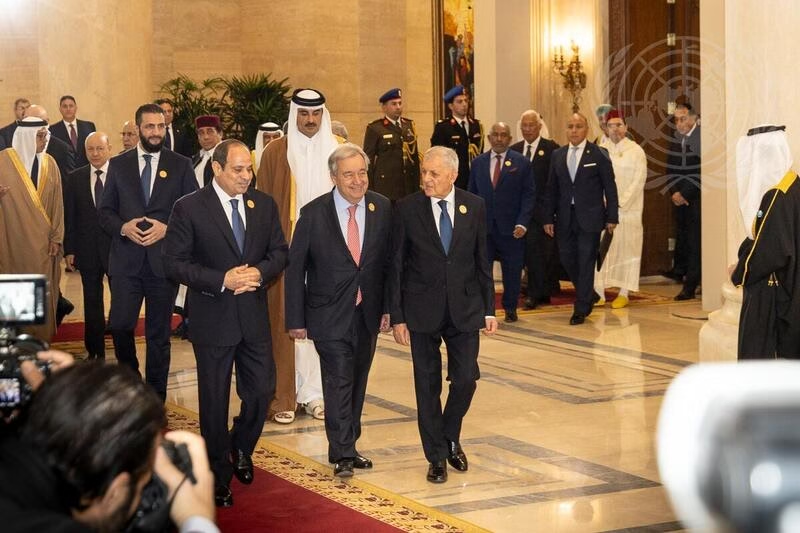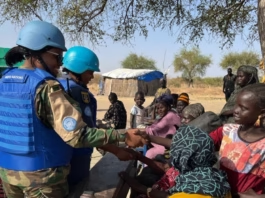Arrival and Purpose of the Visit
On October 13, the Secretary-General arrived in Sharm El-Sheikh, Egypt, amidst heightened international attention regarding the ongoing conflict in Gaza. This visit was strategically timed to coincide with the Sharm El-Sheikh Summit for Peace, an event co-hosted by Egyptian President Abdel Fattah Al Sisi and U.S. President Donald J. Trump. The summit represents a critical platform aimed at fostering dialogue and understanding among conflicting parties. Its primary goal is to facilitate an agreement that can effectively end hostilities in Gaza, thereby paving the way for long-term peace in the region.
The involvement of the Secretary-General is significant, as it underscores the urgency of the situation in Gaza, and reflects the international community’s commitment to resolving these conflicts. The Sharm El-Sheikh Summit serves as an assembly point for world leaders and diplomats, emphasizing collaborative efforts to achieve stability through diplomacy. Given the historical context of previous negotiations, this summit comes with heightened expectations regarding potential peace initiatives and frameworks.
Furthermore, the Secretary-General’s participation highlights the United Nations’ role in mediating international disputes and fostering cooperation among nations. His presence aims to galvanize support for humanitarian efforts in Gaza, thereby addressing the dire needs of civilians caught in the crossfire of the conflict. It also reflects a broader commitment to utilizing diplomatic channels to achieve peace, especially within a framework that encourages protective measures for vulnerable populations affected by violence.
By engaging in discussions and formulating strategies at the summit, the Secretary-General and fellow leaders hope to lay the groundwork for sustainable peace. The approach taken during this visit may set precedence for future diplomatic endeavors, guiding norms and collaborative strategies essential for conflict resolution.
Dialogue with Global Leaders
The recent visit of the Secretary-General to Egypt provided a significant platform for engaging in dialogues with a wide array of international leaders. This summit emphasized the critical role these discussions play in shaping a collective response to the ongoing crises, particularly in Gaza. The Secretary-General utilized this opportunity to advocate for an expansion of the United Nations’ humanitarian efforts, pushing for a unified approach to address the urgent needs of the affected populations.
During these discussions, the Secretary-General articulated the necessity of enhancing cooperation among nations to facilitate essential humanitarian aid. The dialogues underscored the collaborative nature of international relations, with leaders from various countries expressing their commitment to support initiatives aimed at alleviating the suffering in Gaza. The exchange of ideas during the summit enabled a deeper understanding of the barriers impeding humanitarian access and highlighted potential strategies for overcoming these obstacles.
Moreover, the conversations reflected an increasing recognition of the interconnectedness of global issues. The Secretary-General emphasized that peace in the region cannot be achieved in isolation; rather, it necessitates concerted efforts that transcend national borders. His commitment to fostering dialogue among global leaders serves as an important catalyst for mobilizing resources and support for urgent humanitarian missions.
As the international community grapples with complex challenges, the Secretary-General’s discussions in Egypt signify a proactive approach to diplomacy. By reinforcing the importance of dialogue, these meetings contribute to building a foundation for sustainable peace and stability. The outcomes of these interactions are likely to influence future policy decisions and promote a collaborative mindset among nations committed to humanitarian efforts.
Communication with Israeli Leadership
During the Secretary-General’s recent telephone conversation with Israeli President Isaac Herzog, a variety of pivotal topics were addressed, centering on the ongoing peace efforts in the region. The conversation took place against the backdrop of the recently announced release of Israeli hostages from Gaza, a significant event that prompted a sense of cautious optimism. The Secretary-General expressed relief at the release of these individuals, acknowledging the profound emotional toll that such traumatic circumstances impose on the hostages and their families.
The dialogue between the Secretary-General and President Herzog highlighted the urgent need to prioritize the welfare of individuals affected by the ongoing conflict. It was emphasized that addressing the humanitarian concerns underlying the hostages’ situation is crucial in fostering a sustainable peace. The impact on families waiting anxiously for the return of their loved ones cannot be overstated, as they endure significant emotional distress during such harrowing circumstances.
Furthermore, the Secretary-General underscored the importance of continued communication between Israeli and Palestinian leadership to ensure that humanitarian issues are addressed comprehensively. By fostering a climate of open dialogue, both parties can work towards alleviating suffering and building trust, essential elements for a lasting resolution. The Secretary-General’s candid reflections during this conversation serve not only to humanize the crisis but also to remind both leaderships of the shared responsibility in seeking avenues for peace.
Ultimately, the conversation between the Secretary-General and Israeli President Herzog reflects a commitment to addressing the complex layers of the crisis while highlighting the profound personal impacts on those involved. Such dialogues are critical as the international community continues to support efforts toward sustainable peace in the region.
Departure and Reflections
On the morning of October 14, the Secretary-General departed from Sharm El-Sheikh, concluding a significant chapter in his diplomatic efforts aimed at fostering peace and addressing humanitarian issues within the region. As he left the summit, reflections on the urgent discussions held during the event occupied his thoughts. The gathering centered on numerous pressing matters, notably the ongoing humanitarian crisis in Gaza, which has drawn international concern and necessitates immediate action.
The Secretary-General expressed a palpable sense of urgency regarding the situations faced by civilians in Gaza. His interactions with various leaders and stakeholders during the summit highlighted the complexities inherent in political negotiations, yet underscored a collective commitment to finding long-term solutions. He emphasized that the plight of those affected by conflict cannot be ignored and that the international community must remain actively engaged in addressing these humanitarian challenges. With each conversation, it became increasingly clear that coordination between nations is essential in pursuing peace and facilitating relief efforts.
<pmoreover, a="" advocated="" aid="" and="" approach="" as="" collaborative="" comprehensive="" delivery="" desperate="" discussions="" facilitating="" focus="" for="" foster="" global="" he="" his="" how="" humanitarian="" impacting="" implications="" important="" in="" is="" issues="" it="" leaders="" maintain="" mitigating="" multifaceted="" multilateral="" need="" noted="" of="" on="" p="" poignant="" policies.="" region="" reiterated="" reminder="" secretary-general="" served="" stability.="" suffering.
As he departed, the Secretary-General remained resolute in his commitment to advocating for peace, urging continued dialogue and collaboration among nations to promote the well-being of those affected by humanitarian crises, particularly in Gaza.




